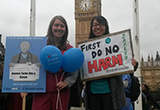 Today the BMA is sending out ballot papers for industrial action in light of the proposed junior doctors’ contract. It is the first time in recent years that junior doctors have found themselves in this situation. A recent poll on thebmj.com asked “Is it ethical for doctors to strike?” 67% voted yes, out of a total of 1573 votes cast. Yet, as an FY1 starting out in my medical career, I wonder why I still feel unsure about this. What ethical reasoning can we use to support strike action to wholeheartedly vote “#yesyes?”
Today the BMA is sending out ballot papers for industrial action in light of the proposed junior doctors’ contract. It is the first time in recent years that junior doctors have found themselves in this situation. A recent poll on thebmj.com asked “Is it ethical for doctors to strike?” 67% voted yes, out of a total of 1573 votes cast. Yet, as an FY1 starting out in my medical career, I wonder why I still feel unsure about this. What ethical reasoning can we use to support strike action to wholeheartedly vote “#yesyes?”
At the heart of industrial action lies an absolute breakdown in the relationship between employer and employee. Both parties need to commit and make concerted efforts to restore this relationship in order for future work to happen. We could perhaps justify a strike in terms of a short term “wrong” resulting in a long term gain.
As doctors, some may feel that industrial action is an absolute wrong as it would fail to uphold our first duty as doctors, to first do no harm—non-maleficence. However, the harm of strike needs to be seen within the context of the very real forseeable long term harm resulting from the new contract, which is unsafe for doctors and patients. Mr Hunt’s imposition of a contract is absolutist and fails to understand the real life complexities of working in a hospital.
Mr Hunt does not have the right to force junior doctors to agree to these changes at all costs, not only because of this foreseeable harm, but because having a right implies a relationship. If the relationship has broken down between employer (Mr Hunt) and employee (junior doctors) there is no right.
Putting all this together, 1) the new contract creates a level of foreseeable patient harm; 2) without a relationship, rights cannot exist. So, is it ethical for doctors to strike? Yes, because it simply comes down to this—no-one has a right to enter into an agreement that harms others, just as no one has the right to force others to do so.
Helena Lee is an FY1 doctor working at Sandwell and City Hospitals, Birmingham in intensive care medicine and general surgery on-calls. She intercalated in healthcare ethics and law from the University of Birmingham in 2013.
Competing interests: I have read and understood the BMJ Group policy on declaration of interests and declare the following interests: I am a FY1 doctor who will be working under the new contract from August 2016, should this go ahead. I attended the Junior Doctor’s Protest in October 2015. I am a member of the BMA. I intercalated in Health Care Ethics and Law at the University of Birmingham in 2013.
